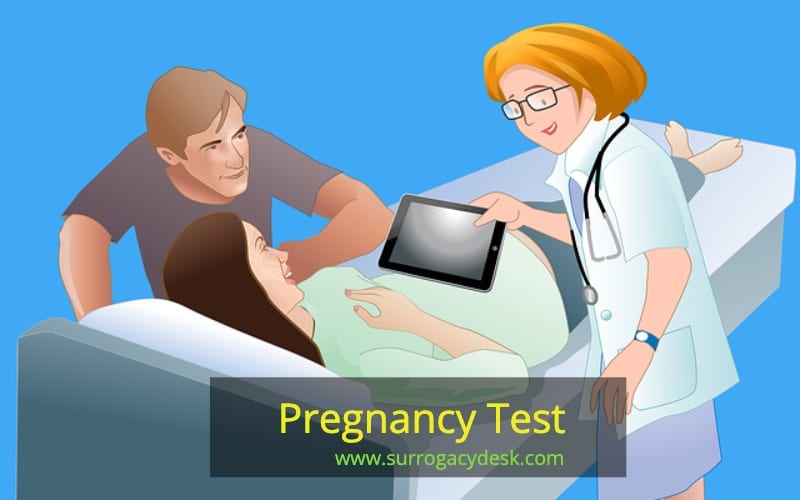Your journey of motherhood starts with a positive urine pregnancy test. This is a do at home card test for pregnancy detection. You may have few symptoms of pregnancy before pregnancy confirmation. However, missed periods is the most consistent one. The two primary methods for pregnancy confirmation are:
- Pregnancy test is Testing for human pregnancy hormones
( human chorionic gonadotropin hCG) in blood or urine of women who had pregnancy symptoms
- Another pregnancy test is Ultrasonography testing blood for hCG results in the earliest detection of pregnancy
Almost all women will have a positive urine pregnancy test one week after the first day of a missed menstrual periods. Few may still bleed but are pregnant. Although this happens rarely you must check urine for pregnancy if you have a suspicion.
VISIT TO HOSPITAL
You must ensure presence of your partner at the first visit to your gynaecologist. This is important to understand the course of pregnancy. This is the best time to clarify all your doubts regarding diet, work , sexual life and exercises in pregnancy.
6 – 10 weeks
At your pregnancy visit, your doctor will check your general health and take a medical history. She will advise you on the diet and lifestyle during pregnancy. Doctor will ask you to take a folic acid supplements for your first trimester.
You will be offered a scan to confirmation and viability scan between 6 and 9 weeks. Your doctor will ask you to do several blood test and urine test done. Finally, she will take your BP and measure weight and height, so that BMI can detect.
11 – 13 weeks
Between 11 and 13 weeks, you will get a nuchal transluceny(NT) scan to screen for disease like down’s syndrome. The scan is usually combined with a blood test done at around the same time to give a more accurate result for any disease.
16 weeks
At 16 week appointment your doctor is likely to discuss the results of the nuchal translucency scan as well as the blood results from your earlier visit.
If your Hb are low, doctor will recommend take iron supplements. She’ll also check your BP, take your weight and, as before test for urine for traces of protein, which can be a sign of pre eclampsia.
18 – 20 weeks
You will be asked to get an anomaly scan to detect any physical abnormalities. This is done around 18-20 weeks as by now all the major organs have formed and can be seen clearly in this scan.
24 weeks
As usual, your doctor will check your BP, weight and urine test for protein.
The Federation of Obstetric and Gynaecological Societies of India (FOGSI) recommends the flu vaccination for all pregnant women from 26 weeks of pregnancy which having the flu vaccine will help to protect mother and baby from swine flu and other strains of flu.
28 weeks
Your doctor may take a blood sample to make sure your Hb are fine and to check for anti biotic. If you’re Rh is negative, you should be offered an anti-D injection to deal with any antibodies in your blood. If low on iron, doctor will suggest appropriate iron supplements.
She’ll also check BP, weight and urine test for protein.
Your doctor will measure bump to check that baby is growing well. She will also recommend you have a growth scan done between 28 and 32 weeks.
32 weeks
Doctor will check your blood pressure and urine, and measure your bump. Doctor feel your bump with her hands to check baby’s position
If you are not immunised for TT get vaccinate.
34 weeks
Your BP and urine will be checked, and bump will be measured to make sure your baby is growing well.
You will most likely be given instructions on how to give yourself perineal massage at this visit. Studies have shown that perineal massage reduces the chances of having an episitomy or tear during birth. Your doctor will also advise you on how to prepare for breastfeeding.
You will be asked to track baby’s movement. doctor will ask you about them at every visit from now on to be sure that the baby is doing well.
36 weeks
Doctor will do routine checks. If you’ve recently had a scan to check the position of your placenta doctor will discuss the results with you.
She’ll feel bump with her hands to check position of baby’s. If your baby is breech position, she may suggest another scan in the coming weeks to see if baby has moved.
The second TT will be given at 36 weeks of pregnancy time.
37 weeks
Your doctor will check your blood pressure and urine, and measure bump. Doctor will also feel your bump with her hands to check baby’s position. If your baby is not breech and the placenta is not low you will have an internal check to assess the pelvis. The doctor will check to see if your cervix has started to dilate and if baby’s head is getting to the cervix.
Your doctor will recommend a scan and Doppler studies if you haven’t had these recently.
38 weeks
Doctor will check your blood pressure and urine, and measure your bump. Doctor will also feel your bump with her hands to check baby’s position.
Your doctor will recommend a scan and colour doppler studies if you haven’t had these recently in the scan.
39 weeks
Your doctor will check your blood pressure, weight and urine, and measure bump. She’ll also feel your bump with her hands to check baby’s position
If you haven’t had your baby yet, she may suggest inducing the birth of baby. You’ll usually be offered an induction sometime between 40 and 41 weeks to prevent your pregnancy continuing beyond this type of pregnancy.
40 weeks
If by now you have not delivered, your doctor will check to see if all is well and then discuss the options of inducing labour or ceaserean.
Read More







